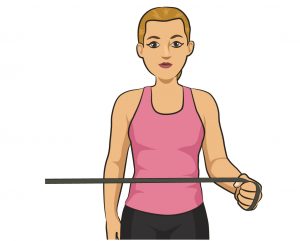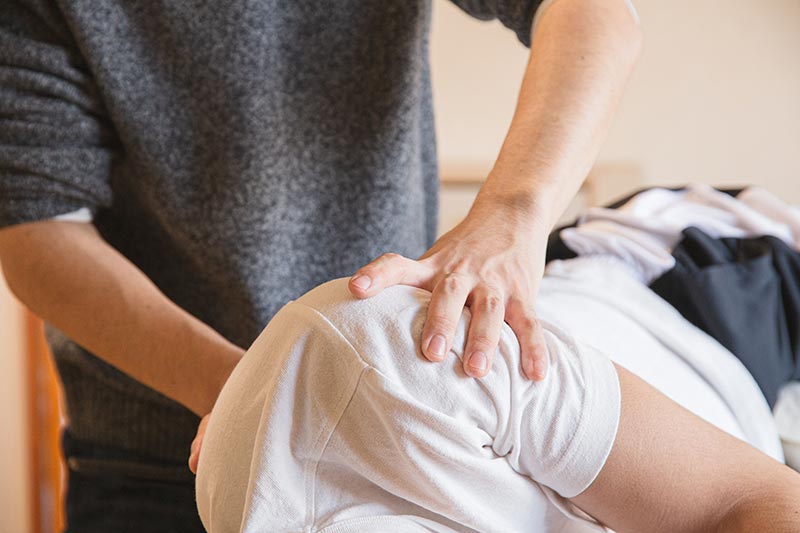Shoulder injuries can be debilitating and hinder your ability to perform everyday tasks. Whether you’ve experienced a rotator cuff tear, shoulder impingement, or dislocation, proper rehabilitation exercises are crucial for a full recovery. There is some evidence that whether your exercise program is designed to address your muscle control or your muscle strength, doesn’t really impact on your recovery. What is important is that your shoulder exercises create minimal pain while you are doing them, and you establish a habit and get into a routine when doing them. In this blog post, we will explore the best shoulder exercises recommended by experts to help you rehabilitate your shoulder and regain strength and mobility.
1. External Rotation with Resistance Band
This exercise targets the rotator cuff muscles, which are commonly affected by shoulder injuries. Attach a resistance band to a sturdy object at waist height. Stand sideways with your injured arm closest to the band. Hold the band with your elbow bent at a 90-degree angle and your forearm parallel to the ground. Slowly rotate your forearm away from your body, keeping your elbow tucked into your side. Just stand as far away as is difficult but not painful for you. Hold for a maximum of 30 seconds and then step closer to the wall again. You can repeat this 3 times. If you cannot hold for 30 seconds, then hold for 20 seconds and repeat the exercise 5 times, or 10 seconds and repeat the exercise 10 times.

2. Scapular Posterior Tilting
Scapular posterior tilting exercises increase the space in the shoulder and help improve posture and strengthen the muscles around the shoulder blades. Lie on your stomach and roll your shoulders back so your shoulders are higher from the ground. Do not lift your head, or lift your hands.

3. Internal Rotation with Resistance Band
This exercise targets the muscles on the front of your shoulder and helps improve internal rotation. Attach a resistance band to a sturdy object at waist height. Stand sideways with your injured arm farthest from the band. Hold the band with your elbow bent at a 90-degree angle and your forearm parallel to the ground. Slowly rotate your forearm towards your body, keeping your elbow tucked into your side. Repeat for 10-15 repetitions.
If this is painful then you shoulder hold your hand just away from your belly so it is not resting, face the band which is tied to the wall and step backwards. This exercise should be difficult by not painful.

4. Bench flexion
If your shoulder is stiff and needs stretching, then moving your shoulder with minimal movement of your muscles will help increase the movement that your shoulder has. Place your hands on a bench and gently walk away from your hands or lean forward. You should feel a gentle pulling in your shoulder. Hold this for a few seconds and then walk back towards the bench

5. YTWL Exercise (Lower trapezius progression)
The YTWL exercise targets the muscles in your upper back and shoulders, helping to improve posture and shoulder stability. Lie face down on an exercise bench with a light dumbbell in each hand. Start with your arms hanging straight down towards the floor. Lift your arms up and out to form a “Y” shape, then move them into a “T” shape, followed by a “W” shape, and finally an “L” shape. Repeat for 10-15 repetitions for each letter.

Remember to consult with a physio at the Auckland Shoulder Clinic before starting any new exercise program, especially if you have a pre-existing shoulder condition or are recovering from a recent injury. You can do this in-person if you live in Auckland, or online if you live in the rest of New Zealand or are overseas. It is important that these exercises are performed with proper form and technique to avoid further injury. Start with light resistance and gradually increase as your shoulder strength improves.
By incorporating these shoulder exercises into your rehabilitation routine, you can speed up your recovery and regain full function of your shoulder. Stay consistent, be patient, and listen to your body. With time and dedication, you’ll be on your way to a stronger, healthier shoulder. If you want a personalised treatment, specifically designed for your unique shoulder problem, then contact the physios at Auckland Shoulder Clinic now.





